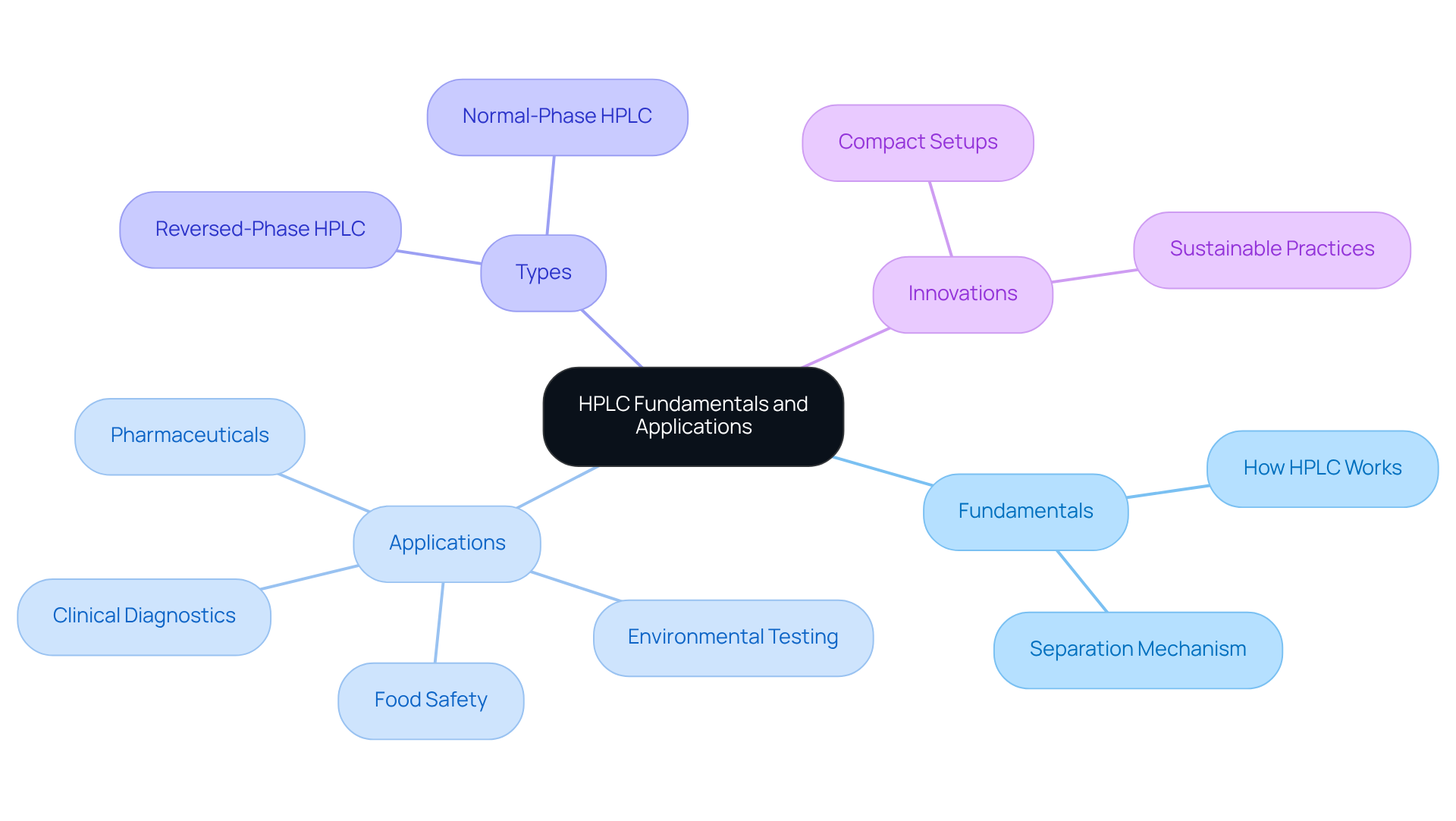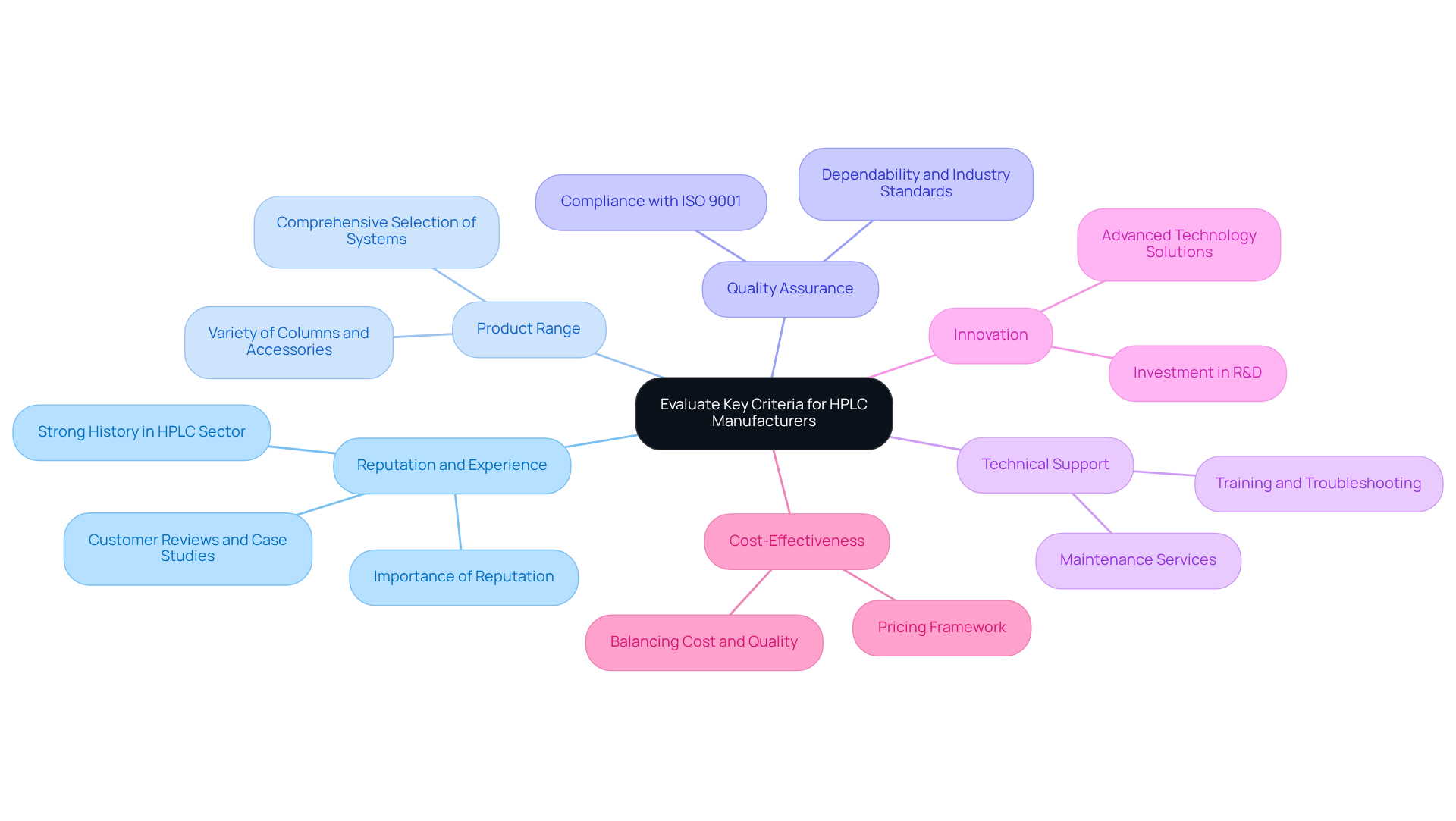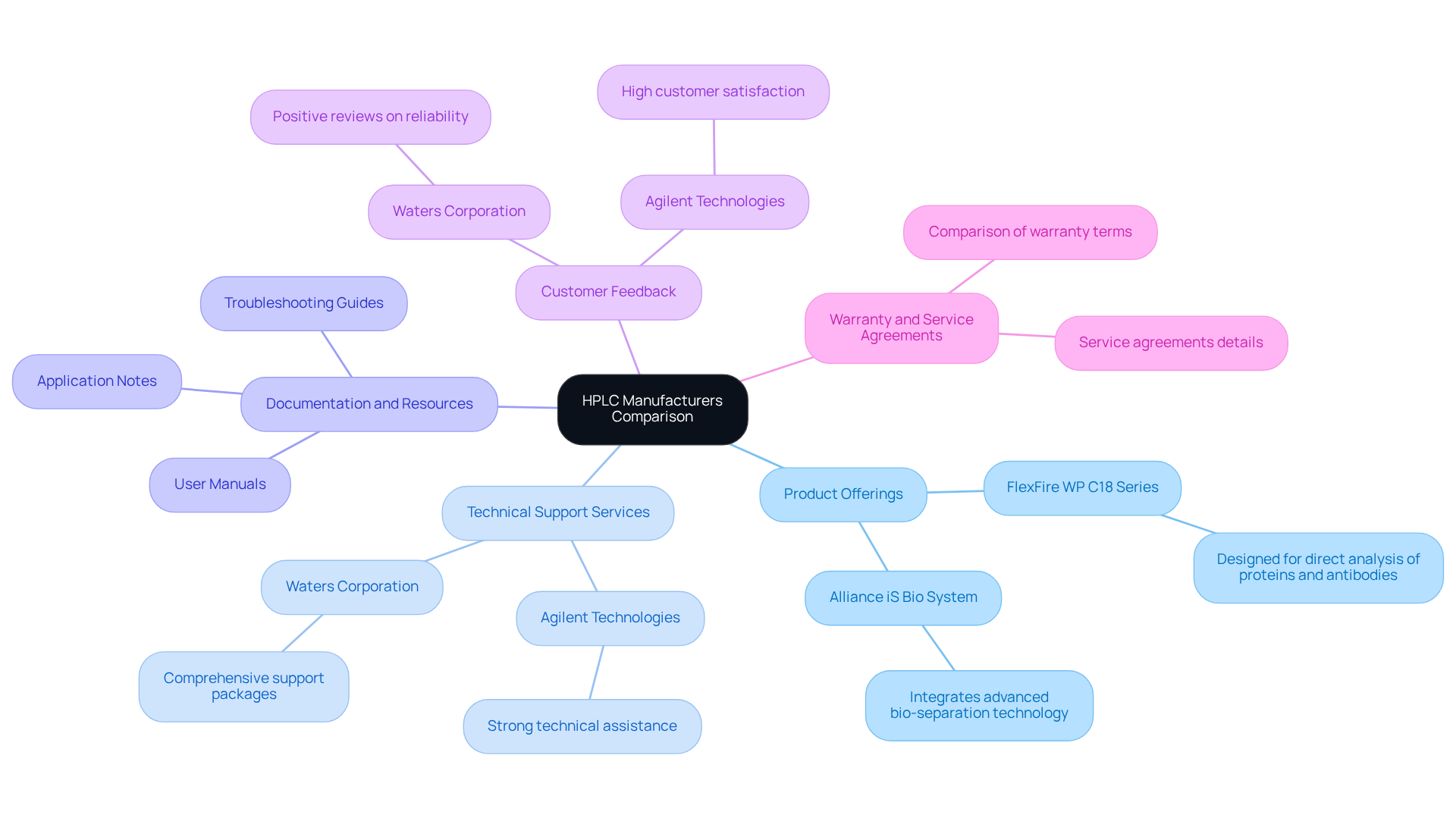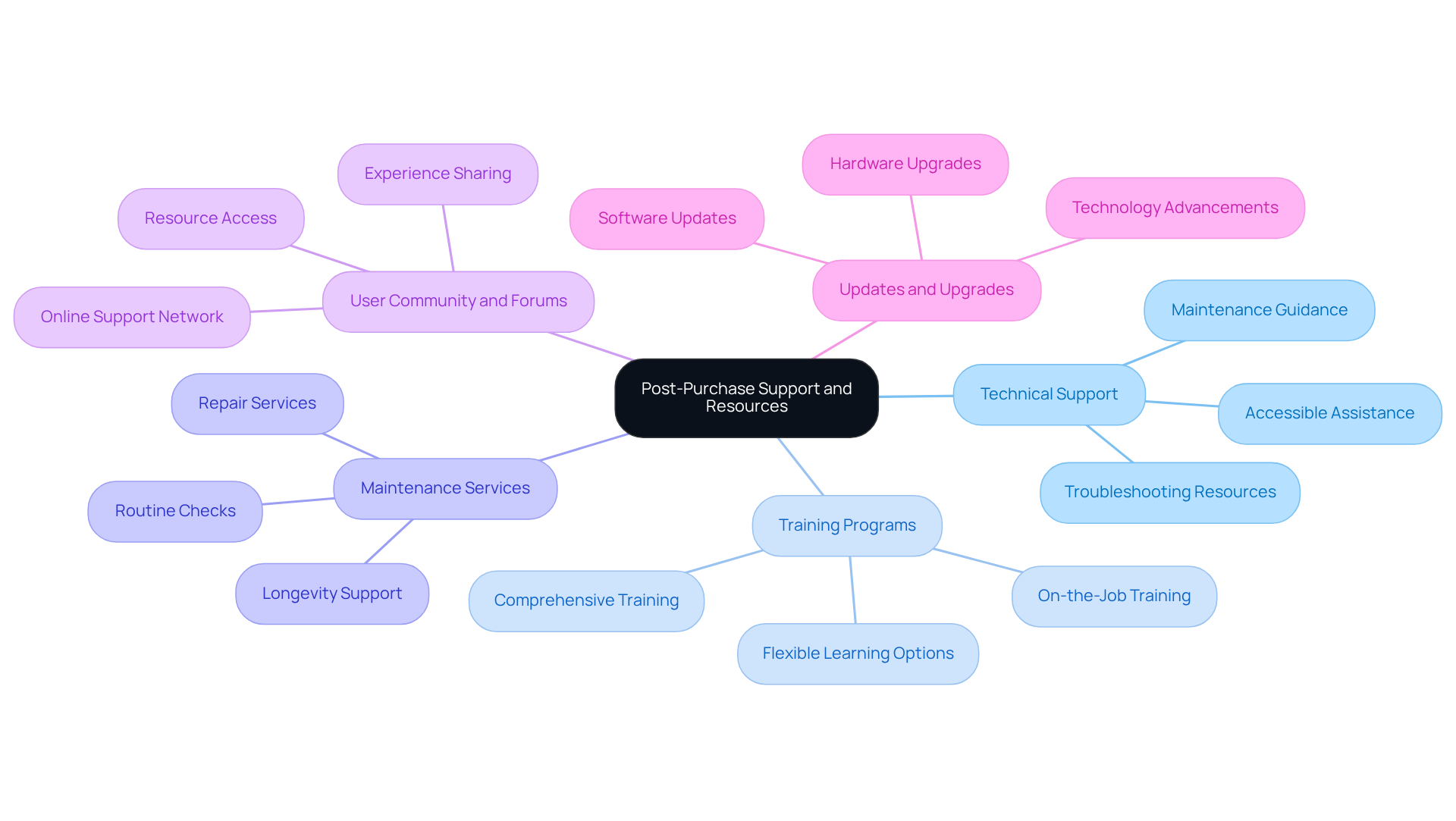Overview
This article centers on the critical process of selecting an HPLC manufacturer tailored to the specific needs of a laboratory. It presents essential evaluation criteria, including:
- Reputation
- Product range
- Quality assurance
- Technical support
- Innovation
- Cost-effectiveness
By emphasizing informed decision-making based on these factors, the article highlights how such choices can significantly enhance laboratory operations and ensure compliance with industry standards. Ultimately, understanding these elements is vital for laboratories aiming to optimize their performance and maintain a competitive edge.
Introduction
High-Performance Liquid Chromatography (HPLC) serves as a cornerstone in analytical chemistry, crucial for the separation and identification of components in complex mixtures across diverse industries. As laboratories strive to enhance their analytical capabilities, the selection of an HPLC manufacturer becomes paramount, significantly influencing both operational efficiency and compliance with industry standards.
With a multitude of options available, how can laboratories ensure they choose the right manufacturer that meets their specific needs and embraces technological advancements? This guide explores the essential criteria for evaluating HPLC manufacturers, providing insights that empower informed decisions to enhance laboratory performance and reliability.
Understand HPLC Fundamentals and Applications
High-Performance Liquid Chromatography (HPLC) is an essential analytical method that effectively separates, identifies, and quantifies components within mixtures. By passing a liquid sample through a column filled with stationary phase material, HPLC facilitates the differential interaction of various components, resulting in their effective separation. This technique plays a pivotal role in pharmaceuticals, environmental testing, food safety, and clinical diagnostics.
Understanding the different types of high-performance liquid chromatography, such as reversed-phase and normal-phase techniques, is crucial for selecting the appropriate system to meet your facility's specific needs. Reversed-phase HPLC is particularly effective for non-polar compounds, while normal-phase HPLC excels with polar compounds. Familiarity with these fundamental differences empowers you to make informed decisions and aligns your facility's capabilities with the latest advancements in chromatography technology.
JM Science Inc., an established HPLC manufacturer, offers an extensive range of high-quality liquid chromatography solutions, including high-performance columns, fittings, and accessories, designed to meet the diverse needs of research facilities. Recent innovations in HPLC technology encompass compact setups for on-site testing and sustainable chromatography practices that utilize eco-friendly solvents, catering to environmentally conscious lab managers. Additionally, JM Science, an HPLC manufacturer, provides competitive pricing and customization options for HPLC systems, allowing facilities to tailor their equipment to specific analytical demands.
As the landscape of high-performance liquid chromatography continues to evolve, staying informed about these trends will enhance your laboratory's analytical capabilities and ensure compliance with stringent regulatory standards.

Evaluate Key Criteria for HPLC Manufacturers
When evaluating HPLC manufacturers, several key criteria should guide your selection process:
-
Reputation and Experience: Prioritize producers with a strong history in the high-performance liquid chromatography sector. Investigate their history, customer reviews, and case studies to assess reliability. A strong reputation for an HPLC manufacturer is invaluable, reflecting years of consistent performance and customer trust. As Warren Buffett noted, "It takes 20 years to build a reputation and five minutes to ruin it," emphasizing the fragility of reputation in the market.
-
Product Range: Ensure the HPLC manufacturer provides a comprehensive selection of HPLC systems, columns, and accessories tailored to your specific applications. A varied product assortment reflects the producer's ability to satisfy diverse research requirements.
-
Quality Assurance: Confirm that the manufacturer complies with quality standards such as ISO 9001. Compliance with these standards ensures that the products from the HPLC manufacturer are consistently dependable and satisfy industry benchmarks, which is essential for preserving integrity in the lab.
-
Technical Support: Evaluate the level of technical support offered, including training, troubleshooting, and maintenance services. A responsive support team can significantly enhance your facility's operational efficiency, ensuring minimal downtime and optimal performance.
-
Innovation: Consider HPLC manufacturers that are actively investing in research and development. Those dedicated to innovation are more likely to offer advanced technology and solutions that can improve your facility's capabilities and efficiency.
-
Cost-Effectiveness: Evaluate the producer's pricing framework to ensure it fits your budget while still providing high-quality products. Balancing cost with quality is essential for sustainable operations in a research setting.
In 2025, customer satisfaction ratings for high-performance liquid chromatography producers will be crucial in influencing buying choices, as 92% of individuals trust companies with an excellent star rating online. Remember, the significance of reputation in chromatography producers cannot be overstated; it shapes customer experiences and ultimately affects your laboratory's success.

Compare HPLC Manufacturers Based on Product Offerings and Support
To effectively compare HPLC manufacturers, it is essential to create a comprehensive comparison chart that encompasses several critical aspects:
-
Product Offerings: Catalog the types of high-performance liquid chromatography systems, columns, and accessories available from each manufacturer. Highlight specialized products, such as the FlexFire WP C18 series, designed for direct analysis of proteins and antibodies, and the innovative Alliance iS Bio System, which integrates advanced bio-separation technology to enhance efficiency for biopharma quality control analysts.
-
Technical Support Services: Assess the range of support services provided, including installation assistance, user training, and ongoing maintenance. Manufacturers that offer comprehensive support packages can significantly enhance laboratory operations. For instance, HPLC manufacturers like Agilent and Waters are recognized for their strong technical assistance, which is essential for optimizing the performance of liquid chromatography equipment.
-
Documentation and Resources: Investigate whether the producer supplies extensive documentation, such as user manuals, application notes, and troubleshooting guides. Access to these resources can enhance workflow and boost efficiency, particularly when handling intricate HPLC setups.
-
Customer Feedback: Collect insights from client testimonials and case studies to assess the experiences of other laboratories with each provider. This feedback can reveal valuable information about product performance and the quality of support services. For example, positive reviews regarding the reliability of Waters Corporation's systems can inform your decision-making process.
-
Warranty and Service Agreements: Compare the warranty terms and service agreements offered by each manufacturer. A robust guarantee can instill confidence about product dependability and long-term effectiveness, which is crucial for ensuring operational continuity in research environments.
By systematically assessing these factors, you can make a well-informed decision when choosing chromatography systems and accessories that best suit your laboratory's requirements.

Assess Post-Purchase Support and Resources
Upon selecting an HPLC manufacturer, it is essential to evaluate the post-purchase support and resources that are available:
-
Technical Support is paramount. Ensure that the HPLC manufacturer provides accessible technical assistance for troubleshooting and maintenance. This may encompass phone support, online chat, or email assistance, all of which are vital for addressing issues promptly.
-
Training Programs should also be a priority. Seek out an HPLC manufacturer that provides comprehensive training programs for laboratory personnel. Proper training is crucial as it significantly enhances the effective use of HPLC systems and boosts overall productivity.
-
Maintenance Services play a critical role in equipment longevity. Assess the availability of maintenance services, including routine checks and repairs. Regular maintenance is key to preventing downtime and extending the lifespan of your equipment.
-
A User Community and Forums can offer invaluable support. Investigate whether the producer has an online community or forum where users can share experiences, pose questions, and access additional resources. This network can serve as a valuable support system for users.
-
Lastly, consider Updates and Upgrades. Inquire about the manufacturer's policy regarding software updates and hardware upgrades. Staying current with technology is essential for enhancing the performance of your HPLC systems. By carefully considering these factors, you can ensure that your investment in HPLC technology is effectively supported by an HPLC manufacturer.

Conclusion
Selecting the right HPLC manufacturer is vital for laboratories aiming to enhance their analytical capabilities. Understanding HPLC fundamentals and applications, along with the critical criteria for evaluating potential manufacturers, is essential. By grasping the nuances of HPLC technology and aligning them with the specific needs of your lab, informed decisions can be made that significantly impact research outcomes.
Key criteria such as:
- reputation
- product range
- quality assurance
- technical support
- innovation
- cost-effectiveness
are essential in the selection process. Each of these factors plays a crucial role in ensuring that the chosen manufacturer not only meets current demands but also supports future advancements in high-performance liquid chromatography. Furthermore, post-purchase support, including training and maintenance services, is paramount for sustaining operational efficiency and maximizing the lifespan of HPLC systems.
In conclusion, selecting an HPLC manufacturer requires thorough research and careful consideration. Prioritizing manufacturers that demonstrate a commitment to quality, innovation, and customer support enables laboratories to secure the tools necessary for success in their analytical endeavors. Investing time in this selection process is not merely a step towards acquiring equipment; it is a strategic move that can propel research capabilities and enhance overall laboratory performance.




